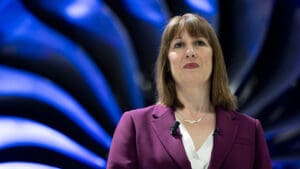Chancellor Rachel Reeves has confirmed for the first time that tax rises and spending cuts are both being considered for next month’s Budget, acknowledging the scale of the fiscal black hole confronting her new government.
Speaking to Sky News in her first interview since receiving the Office for Budget Responsibility’s (OBR) draft report, Reeves said: “Of course, we’re looking at tax and spending as well. The numbers will always add up with me as chancellor.”
Her comments mark a shift in tone from earlier interviews where she avoided any direct mention of tax rises, insisting instead that “growth” would remain the government’s focus.
The OBR report — presented to Reeves on 3 October — revealed a £30 billion shortfall in the public finances, largely the result of a productivity downgrade, policy reversals on welfare reforms, and the scrapping of planned cuts to winter fuel payments.
“I won’t duck those challenges”
Reeves said she would not relax her fiscal rules, which require that by 2029-30 the government’s day-to-day spending is funded entirely by tax receipts, not borrowing. That commitment makes new tax rises almost unavoidable.
“I was really clear during the general election campaign that I would always make sure the numbers add up,” Reeves said. “Challenges are being thrown our way — geopolitical uncertainty, trade barriers, and now the OBR’s productivity review. But I won’t duck those challenges.”
Asked whether she could promise to avoid a “doom loop” of annual tax hikes to fill recurring fiscal gaps, Reeves stopped short of giving an outright assurance.
“Nobody wants that cycle to end more than I do,” she said. “That’s why I’m focused on growing the economy.”
Pressed further, she rejected the “doom loop” label, noting that Britain was the fastest-growing G7 economy in the first half of 2025.
The International Monetary Fund (IMF) this week slightly upgraded the UK’s growth forecast for 2025 to 1.3%, but trimmed its outlook for 2026 by the same margin, leaving medium-term growth prospects 0.4 percentage points weaker than the Fund’s projections last autumn.
Reeves said the combination of sluggish productivity, geopolitical instability and post-Brexit trade frictions had deepened the challenge of restoring stability to the public finances.
“We saw just three years ago what happens when a government loses control of the public finances — inflation and interest rates went through the roof,” she said.
Her remarks referenced the 2022 Liz Truss mini-budget, which triggered a market crisis and left a lasting political scar.
The chancellor also attributed much of Britain’s fiscal strain to Brexit, austerity, and the mini-budget fallout, warning that each had taken a structural toll on growth.
“Austerity, Brexit, and the ongoing impact of Liz Truss’s mini-budget have all weighed heavily on the economy,” Reeves said. “People already thought the UK economy would be around 4% smaller because of Brexit. There’s no doubt the impact has been severe and long-lasting.”
Reeves argued that the government’s new EU cooperation deal, covering food, energy, and youth mobility, had begun to “undo some of that damage”.
The remarks risk alienating some Leave-voting Labour supporters — around one in five of whom backed the party at July’s general election — but underline Reeves’s commitment to fiscal honesty, a theme she has made central to her leadership of the Treasury.
The interview came hours before Reeves flew to Washington, D.C., to attend the annual IMF and World Bank meetings, where she will meet global finance ministers to discuss economic coordination amid rising trade tensions and energy volatility.
Officials say the chancellor’s immediate focus remains on finalising the 26 November Budget, which is expected to combine targeted tax rises, selective departmental cuts, and investment incentives aimed at boosting productivity.

